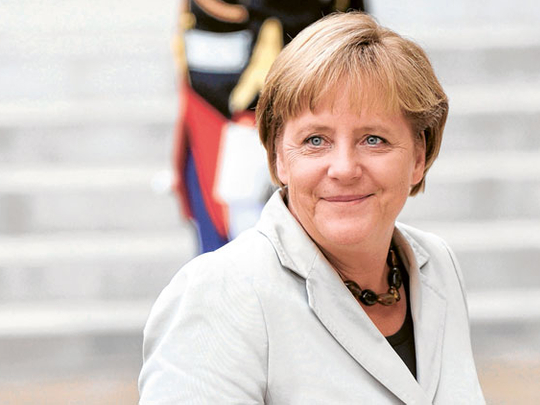
London: Europe's most indebted nations are under heavy pressure from their richer neighbours to sort out their finances, but they are unlikely to mimic the impoverished gentlefolk of old by selling off the family silver — or in their case, gold — to do so.
More than 750 tonnes of gold are currently sitting in the state coffers of Portugal, Greece and Spain alone, equal to about 17 per cent of the 2010 annual supply of bullion from mining and sales of scrap.
Despite struggling with massive debt burdens and in some cases accepting multi-billion-euro bailout packages, the so-called PIIGS — the countries above, plus Ireland and Italy — have not dipped into their gold reserves to service that debt.
At a time when gold prices have rallied to record highs near $2,000 (Dh7,360) an ounce, this has raised eyebrows elsewhere in Europe.
Pressure to sell
Senior German lawmaker Michael Fuchs, deputy leader of Chancellor Angela Merkel's Christian Democrats, said last month that Italy should sell its gold reserves to avoid taking on new borrowing.
And back in May, German politician Frank Schaeffler told Bild newspaper that Portugal should sell its assets. "Before risking other people's money, Portugal should first sell its family jewels, especially its gold reserves," he said.
But these demands ignore the fact that this gold is not the property of the PIIGS' governments to sell.
"Foreign exchange reserves are held and managed by central banks, not by governments," said Natalie Dempster, director of government affairs at the World Gold Council.
"In the past you could have had incidences where governments might try to overstimulate their economies by running exceptionally loose monetary policy before an election," she said. "That is a reason why it is critical, in an advanced economy, that central banks are independent."
Two years ago the Italian government's proposal to tax the unrealised gains on its gold reserves was promptly slapped down by the European Central Bank (ECB), which issued a legal opinion to block the plan in July 2009.
Threat to finances
The ECB said the move could violate a ban on using central bank resources to finance the public sector, risked breaching the Bank of Italy's independence and threatened to weaken the country's finances.
And while gold prices are at record highs, the gold market is still dwarfed by the size of Europe's debts.
Between them Portugal, Ireland, Italy, Greece and Spain hold some 3,233 tonnes of gold, worth some €132 billion (Dh694 billion). Their combined outstanding public debt, according to estimates from the IMF, is around €3,289 billion.
If Portugal sold every ounce of its 382.5 tonnes of gold, it would only raise some €14.9 billion — less than a fifth of a recent EU bailout package.
Italy, the biggest gold holder among the PIIGS and the world's fourth-largest official sector holder of the metal, has 2,450 tonnes, worth €95 billion at today's prices.
But selling this gold in any volume would probably precipitate a crash in prices and would further undermine confidence in Italy's ability to manage its finances. The financial crisis has made European central banks less, not more, interested in selling gold. Official sector sales were so high in the 1990s that banks united to sign the Central Bank Gold Agreement to limit sales to 400 tonnes a year.
Gold is increasingly seen as a valuable portfolio diversifier for the official sector and a safe store of value at a time paper currencies are under pressure.
British example
"Spain (and) Portugal sold a lot of their holdings in the past decade," said John Bowler of the Economist Intelligence Unit. "(While it is) frowned on for the central bank to transfer its assets to the government, I assume that's what was going on with these sales. It was certainly what happened in the UK ."
Britain's then-Chancellor Gordon Brown sold 395 tonnes of gold between 1999 and 2002, at the start of a 10-year rally that saw prices rise 600 per cent. The sale of gold that would now be worth $23.1 billion raised about $3.5 billion.
Given how badly some European economies are already doing, it would take a brave official to risk a similar move now.
Options: Metal can still be used if not sold
If sales are off the table, there are other ways for gold to be of use to heavily indebted countries. For example, former Italian prime minister Romano Prodi, writing in Italian newspaper Il Sole 24 Ore in August, proposed the creation of a euro bond backed by member states' gold reserves.
But such proposals remain little explored, analysts say.
"It has slightly surprised me that some of them haven't looked harder at some creative uses of gold in terms of gold-backed bonds, which might be a useful way of trying to lower the cost of borrowing," said Philip Klapwijk, executive chairman of metals consultancy GFMS.
"But again, they come up against the fact that the scale of the borrowing required is so large that there are probably other ways of trying to deal with the problem rather than using gold. That would probably be a drop in the bucket."












